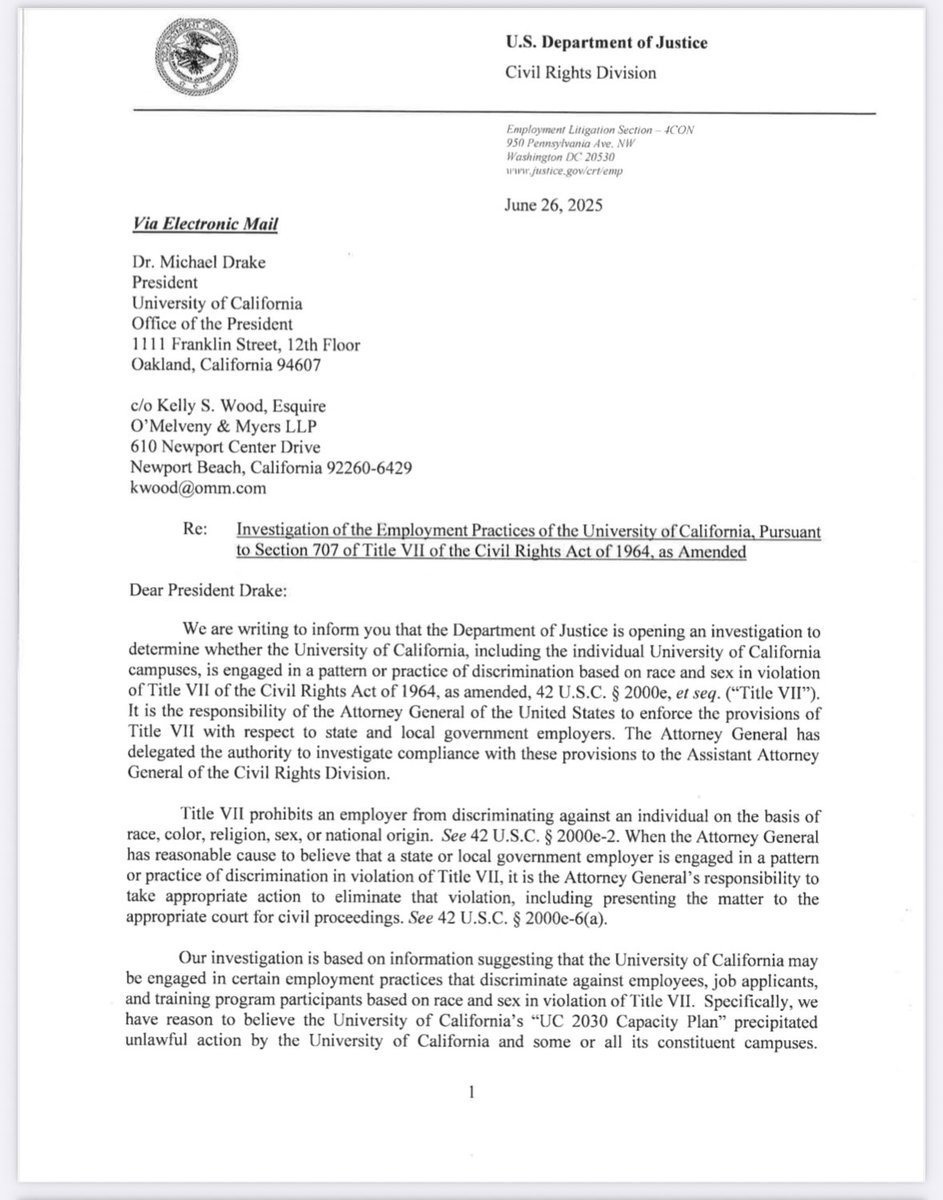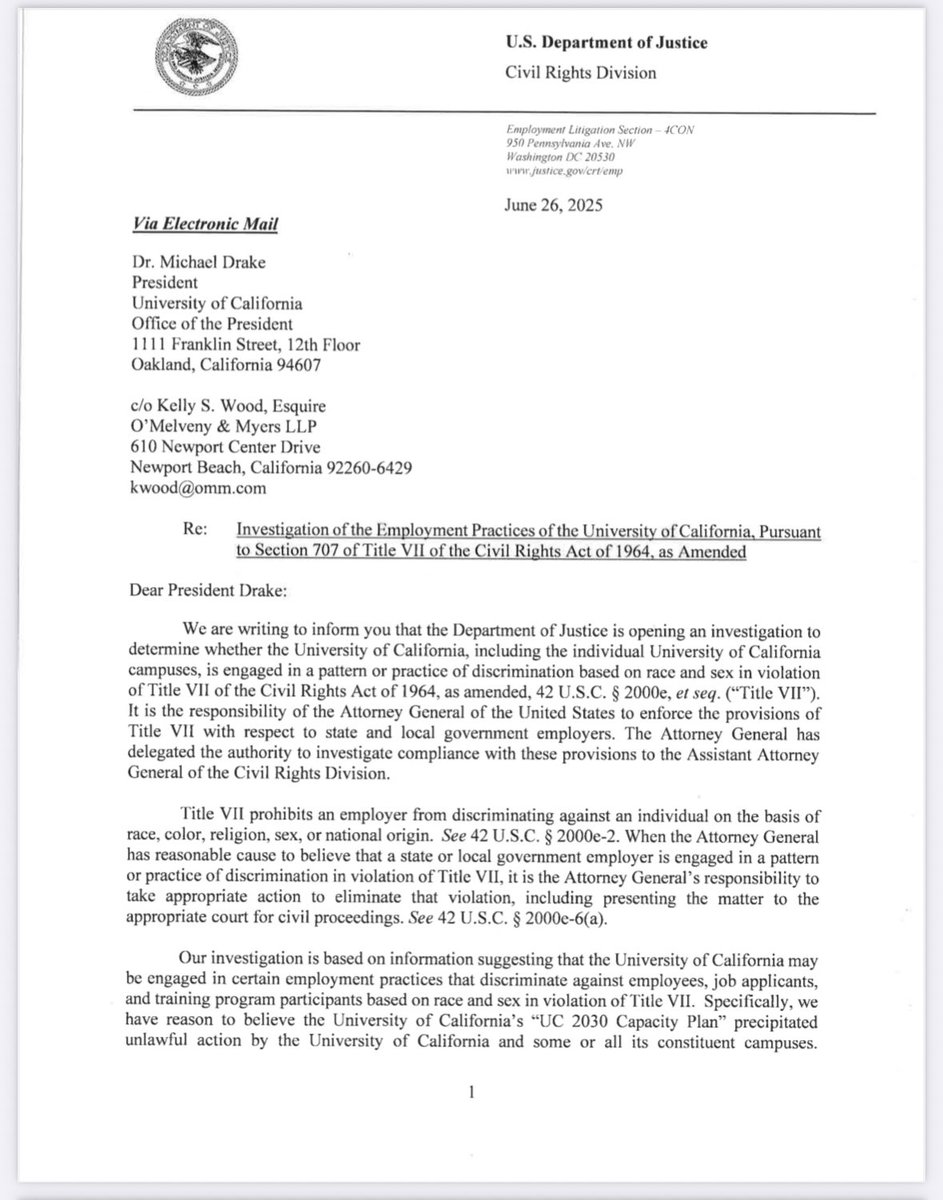DOJ’s Shocking Probe: UC’s DEI Hiring Sparks Race & Sex Bias Claims!
DOJ investigation into University of California’s Hiring Practices
In a significant development, the Department of Justice (DOJ) has initiated an investigation into the University of California (UC) system, marking a pivotal moment in the discourse surrounding diversity, equity, and inclusion (DEI) in academic hiring. This investigation arises from allegations of discriminatory hiring practices, specifically relating to race and gender. The UC system is notable for being the first to implement DEI statements as a mandatory component of its hiring process, which has sparked controversy and debate among educators, policymakers, and the public.
Background on DEI Statements
Diversity, Equity, and Inclusion (DEI) statements are intended to foster a more inclusive academic environment by requiring candidates to articulate their commitment to these principles during the hiring process. The University of California adopted this practice to ensure that prospective faculty members not only possess academic qualifications but also demonstrate an understanding and commitment to promoting diversity within their respective fields. However, this approach has faced criticism for potentially leading to discriminatory hiring practices that prioritize certain demographics over others.
Allegations of Discrimination
The DOJ’s investigation is prompted by allegations that the UC system’s use of DEI statements has resulted in discrimination against applicants based on their race and sex. Critics argue that the emphasis on DEI may inadvertently disadvantage qualified candidates who do not fit specific demographic profiles or who may not align with the university’s particular ideological stance on diversity issues. This raises important questions about fairness and equity in hiring practices within higher education.
Public Reaction and Implications
The announcement of the DOJ’s investigation has elicited varied responses from different stakeholders. Supporters of the investigation argue that it is a necessary step towards ensuring fairness in hiring and that it could serve as a precedent for other institutions that have adopted similar DEI policies. On the other hand, advocates for DEI initiatives express concern that the investigation may undermine efforts to promote diversity in academia and could lead to a chilling effect on the implementation of similar policies in other institutions.
- YOU MAY ALSO LIKE TO WATCH THIS TRENDING STORY ON YOUTUBE. Waverly Hills Hospital's Horror Story: The Most Haunted Room 502
Legal and Ethical Considerations
The legal implications of the DOJ’s investigation are significant. If the investigation finds evidence of discriminatory practices, it could lead to changes in hiring policies not only at the University of California but potentially across the entire higher education landscape. This situation raises important ethical considerations about how universities balance the need for diversity with the principles of meritocracy and fairness in hiring.
The Role of Public Discourse
This investigation underscores the importance of public discourse around DEI initiatives and their impact on academic hiring. As cases like this unfold, it is essential for universities to engage in transparent discussions about their hiring practices, the rationale behind DEI statements, and the potential consequences of these policies. Open dialogue can help clarify misunderstandings and foster a more inclusive environment for all applicants.
Conclusion
The DOJ’s investigation into the University of California’s hiring practices marks a critical juncture in the ongoing debate surrounding diversity, equity, and inclusion in higher education. As the investigation unfolds, it will be essential to monitor its outcomes and implications for the future of academic hiring. The balance between promoting diversity and ensuring fair hiring practices is a complex issue that will continue to shape the landscape of higher education for years to come.
—
This summary serves as an overview of the current situation regarding the DOJ investigation into the University of California and its use of DEI statements in hiring. With an emphasis on SEO optimization, it highlights key points while ensuring clarity and engagement for readers seeking to understand the implications of this development in academic hiring practices. By focusing on relevant keywords such as "DOJ investigation," "University of California," "DEI statements," and "discrimination in hiring," this summary is designed to attract search engine traffic and provide valuable insights into this evolving topic.

GREAT news: The DOJ is investigating the University of California — the first place to use DEI statements in academic hiring — for alleged discrimination in hiring on the basis of race and sex.@HarmeetKDhillon’s letter: pic.twitter.com/Imv9obuVl7
— Steve McGuire (@sfmcguire79) June 26, 2025
GREAT NEWS: The DOJ is Investigating the University of California
If you’ve been following the ongoing debates around diversity, equity, and inclusion (DEI) in academia, you might want to sit up and take notice. The University of California (UC) system, known for being the first to incorporate DEI statements into its academic hiring processes, is now facing scrutiny. The Department of Justice (DOJ) has launched an investigation into allegations of discrimination in hiring practices, specifically concerning race and sex. This development raises significant questions about the effectiveness and fairness of DEI initiatives in educational institutions.
The Background of DEI in Hiring
DEI statements have become a hot topic in recent years, especially in academic settings. They are intended to promote a more inclusive environment by prioritizing candidates who demonstrate a commitment to diversity and social justice. However, the implementation of these statements has sparked controversy, leading some to argue that they may inadvertently promote reverse discrimination.
The DOJ’s investigation into the University of California raises a critical issue: Are these DEI initiatives doing more harm than good? According to [Harmeet K. Dhillon](https://twitter.com/HarmeetKDhillon), a civil rights attorney, the letter detailing the investigation suggests that the UC system might be favoring certain demographics over others, ultimately undermining merit-based hiring practices. This could have far-reaching implications for how universities approach DEI in the future.
What the Investigation Entails
The DOJ is looking into complaints that the University of California’s hiring practices may be discriminatory. This investigation is particularly significant because UC was a pioneer in implementing DEI statements in its hiring processes. The DOJ aims to determine whether the university is violating federal laws that prohibit discrimination based on race and sex.
In a world where DEI is touted as a pathway to equality, it seems paradoxical that a system designed to uplift underrepresented groups might also be accused of bias. The findings of this investigation could redefine how DEI is integrated into hiring practices across academic institutions nationwide.
Implications of the DOJ’s Findings
The outcome of the DOJ’s investigation could lead to significant changes in how universities implement DEI initiatives. If the investigation finds that the University of California has indeed engaged in discriminatory practices, it may compel institutions across the country to reevaluate their hiring criteria and policies.
Moreover, such findings could fuel ongoing debates surrounding affirmative action and meritocracy in academia. Critics of DEI initiatives have long argued that they can lead to reverse discrimination, where qualified candidates are overlooked in favor of those from underrepresented groups. If the DOJ confirms these allegations, it could lend credence to these concerns and ignite further discussions on the balance between diversity and merit.
What Does This Mean for the Future of DEI?
As the investigation unfolds, many are left wondering what the future holds for DEI initiatives in higher education. Will universities continue to prioritize DEI statements in hiring, or will they shift towards a more merit-based approach? The stakes are incredibly high, and the consequences of this investigation could reverberate throughout academic institutions for years to come.
If the DOJ’s findings reveal systemic issues, universities may need to overhaul their hiring practices to ensure compliance with federal laws. This could mean reevaluating how DEI statements are constructed and assessed during the hiring process. As institutions strive to create inclusive environments, they must also ensure that they are not inadvertently engaging in discriminatory practices.
The Broader Conversation on Diversity and Inclusion
The investigation into the University of California brings to light a broader conversation about diversity and inclusion in all sectors, not just academia. As organizations strive to create equitable workplaces, they must tread carefully to avoid potential pitfalls. The goal of promoting diversity should not come at the expense of fairness and meritocracy.
This dilemma raises pertinent questions: How do we define diversity? What does it mean to be inclusive? And how can organizations balance these ideals with the need for qualified candidates? The answers are complex and will require input from various stakeholders, including educators, policymakers, and the communities they serve.
Public Reactions and Perspectives
Public reaction to this investigation has been mixed. Some individuals applaud the DOJ for taking a stand against potential discrimination, arguing that it’s essential to hold institutions accountable for their hiring practices. Others believe that such an investigation undermines the progress made in promoting diversity and inclusion, fearing that it could lead to a rollback of DEI initiatives altogether.
Social media has been abuzz with opinions on the matter, with many expressing their views on platforms like Twitter. The conversation is vibrant and reflects the complexities of navigating issues of race, gender, and equality in today’s society. [Steve McGuire](https://twitter.com/sfmcguire79/status/1938327042551955885) shared the news on Twitter, highlighting how this investigation could change the landscape of academic hiring as we know it.
The Role of Universities in Shaping DEI Policies
Universities play a critical role in shaping the discourse around diversity and inclusion. As educators, they are tasked with preparing future leaders and thinkers. Therefore, they must lead by example when it comes to implementing fair and just hiring practices. The findings of the DOJ’s investigation could serve as a wake-up call for institutions to reevaluate their approach to DEI.
It’s essential for universities to engage in self-reflection and seek feedback from stakeholders to ensure that their hiring practices promote diversity without compromising fairness. By fostering an inclusive environment that values diverse perspectives while also prioritizing merit, universities can set a standard for other organizations to follow.
Moving Forward: A Call for Balanced DEI Initiatives
As we await the outcome of the DOJ’s investigation into the University of California, it’s crucial for academic institutions to engage in constructive dialogue about DEI. The aim should be to develop balanced initiatives that promote diversity while also respecting the principles of fairness and merit. This may involve refining DEI statements and ensuring that they do not inadvertently lead to bias in hiring practices.
Stakeholders across the educational spectrum must come together to create a framework that addresses the complexities of diversity and inclusion. This framework should emphasize the importance of hiring qualified candidates while also striving to create a more equitable environment for all.
In the meantime, the situation at the University of California serves as a reminder of the delicate balance that must be struck between promoting diversity and upholding merit-based principles. The ongoing conversation around DEI will undoubtedly continue to evolve, and it will be fascinating to see how institutions respond to the challenges and opportunities that lie ahead.

